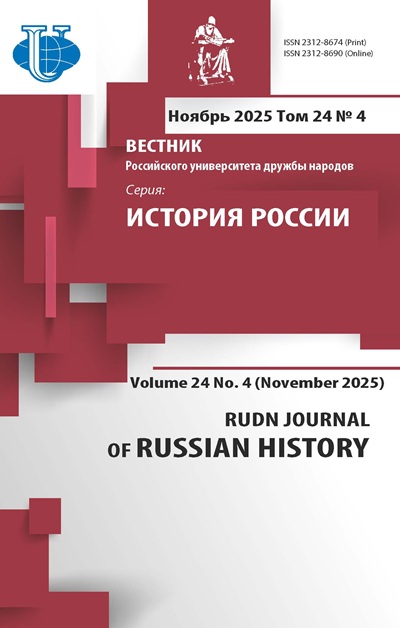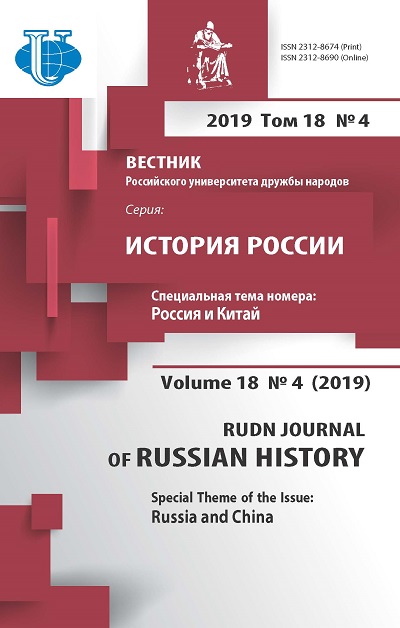Иван IV и Елизавета I: влияние матримониальных проектов царя на развитие русско-английских отношений
- Авторы: Гросс Д.W.1
-
Учреждения:
- Королевский колледж Лондона
- Выпуск: Том 18, № 4 (2019): РОССИЯ И КИТАЙ
- Страницы: 938-961
- Раздел: СТАТЬИ
- URL: https://journals.rudn.ru/russian-history/article/view/22315
- DOI: https://doi.org/10.22363/2312-8674-2019-18-4-938-961
- ID: 22315
Цитировать
Полный текст
Аннотация
В статье рассматривается проблема матримониальных намерений русского царя Ивана Грозного, не раз обращавшегося к английской королеве Елизавете I с предложением брачного союза. Прежде всего, на основании выявленных источников и английской историографии выясняется реальность существования этих планов, опровергается существующее в литературе предположение об их мифологичности. При этом прослеживается влияние брачных проектов на развитие русско-английских отношений, устанавливается, что периодическое возвращение Ивана IV к идее династического союза было сопряжено с ухудшением дел как в самой России, так и на международной арене. Возможный брак с английской королевой рассматривался русским монархом как средство не только укрепления собственной власти, но и выхода России из международной изоляции. В статье обращается внимание на то, что развитие тесных дипломатических отношений между двумя странами способствовало предоставлению Иваном IV английским купцам торговых преференций. Это «невиданное» в прошлом и «немыслимое» сегодня «дружелюбие» даже дало основание русским боярам называть Ивана Грозного «английским царем». Деятельность же Московской компании, внесшей немалый вклад в процветание английской экономики, станет ориентиром для многих торговых предприятий, заложивших основу величия Великобритании. Однако после отказа Елизаветы I от предложения «руки и сердца» московского правителя, вызванного, прежде всего, политическими соображениями, а также различным пониманием роли монарха, английские купцы утратили свое привилегированное положение в России, а отношения между двумя странами больше никогда не подымались на уровень, достигнутый в середине ХVI в. Следует заметить, что часть исследователей к причинам королевского неприятия брачного проекта относят серьезные цивилизационные различия, существовавшие между двумя странами, проявлявшиеся, например, в многоженстве, жестокосердии и деспотизме русского царя. Интерес представляют и выявленные в статье особенности в восприятии двумя монархами природы своей власти. Так, разгневанный отказом Елизаветы, русский царь упрекал ее за согласие с ограничением королевской власти «торговыми людьми», а свое превосходство видел в самодержавном характере правления.
Об авторах
Джордж Гросс
Королевский колледж Лондона
Автор, ответственный за переписку.
Email: george.gross@kcl.ac.uk
доктор теологических наук (PhD), научный сотрудник Королевского колледжа Лондона. Является одним из организаторов семинара «Религиозная история Британии, 1500-1800», проводимого в Институте исторических исследований в Лондоне.
WC2B 6LE, Великобритания, Лондон, ул. Кингсвэй, д. 22, стр. Вирджиния Вулф БилдингСписок литературы
- Abramova, N. “English Silver of the Sixteenth and Seventeenth Centuries in the Kremlin.” In Britannia and Muscovy: English Silver at the Court of the Tsars, 36-45. New Haven, Connecticut: Yale Centre for British Art Publ., 2006
- Andrew, C. The Secret World: A History of Intelligence. London: Penguin Publ., 2018.
- Alford, S. London’s Triumph: Merchant Adventurers and the Tudor City. London: The Spectator Publ., 2017.
- Alsop, J. “The Revenue Commission of 1552.” The Historical Journal, no. 22 (1979): 511-533.
- Bobrick, B. Fearful Majesty: The Life and Reign of Ivan the Terrible. Montpelier, Vermont: Russian life books Publ., 2014.
- Bogatyrev, S. “Bronze Tsars: Ivan the Terrible and Fedor Ivanovich in the Décor of Early Modern Guns.” The Slavonic and East European Review, no. 88 (2010): 48-72.
- Bogatyrev, S. “Reinventing the Russian Monarchy in the 1550s: Ivan the Terrible, the Dynasty, and the Church.” The Slavonic and East European Review, no. 85 (2007): 271-293.
- Beem, C., and Levin, C. “Why Elizabeth Never Left England.” In The Foreign Relations of Elizabeth I, 3-26. New York: Palgrave Macmillan Publ., 2011.
- Bertolet, A.R. “The Tsar and the Queen: “You Speak a Language that I Understand Not.” In The Foreign Relations of Elizabeth I,101-124. London: Springer Publ., 2011.
- Black, J. The Hanoverians: The History of a Dynasty. London: Humbledon Publ., 2004. Bullock, A. Hitler and Stalin: Parallel Lives. London: Harper Collins Publ., 1991.
- Clarkson, J.D. A History of Russia. London: Random House Publ., 1961.
- Crosby, A.J. Calendar of State Papers Foreign: Elizabeth, 1569-1571. London: Her Majesty’s Stationery Office Publ., 1874.
- Grey, I. Ivan The Terrible. London: Hodder & Stoughton Publ., 1964.
- Cressy, D. “Saltpetre, State Security and Vexation in Early Modern England.” Past and Present, no. 212 (2011): 74-111.
- Davies, G. “The Expansion of Trade and Finance, 1485-1640.” In History of Money, 176-237.
- Cardiff: University of Wales Press Publ., 2002.
- De Madariaga, I. Ivan the Terrible: First Tsar of Russia. New Haven: Connecticut Publ., 2005. Doran, S. Monarchy and Matrimony. The courtships of Elizabeth I. London: Routledge Publ., 1996
- Doran, S. Elizabeth I and Her Circle. Oxford: Oxford University Press Publ., 2015
- Doran, S. Elizabeth I and Foreign Policy, 1558-1603. London: Routledge Publ., 2000
- Dmitrieva, O. “Introduction: “The Golden Chain of Traffic”: The First Hundred Years of AngloRussian Relations.” In Britannia and Muscovy: English Silver at the Court of the Tsars, 12-35. New Haven, Connecticut: Yale Centre for British Art Publ., 2006
- Evans, J. Tudor Adventures. An Arctic Voyage of Discovery: The Hunt for the Northeast Passage. New York: Pegasus Publ., 2014.
- Filyushkin, A. Ivan the Terrible: A Military History. Barnsley: Frontline Books Publ., 2008.
- Graham, H.F. “How do we know what we know about Ivan the Terrible? (A Paradigm).” Russian History, no. 14 (1987): 179-198.
- Gralya, I. Ivan Mikhaylov Viskovatyy: Kar’yera gosudarstvennogo deyatelya v Rossii XVI v. Moscow: Radiks Publ., 1994 (in Russian).
- Gross, G. “From London to Moscow coronations: perceptions of monarchy,” Systems psychology and sociology, no. 2 (26) (2018): 97-110.
- Halperin, C.J. “Ivan IV as Autocrat (Samoderzhets),” Cahiers du Monde russe, no. 55 (2014): 197-213
- Halperin, C.J. Ivan the Terrible: Free to Reward & Free to Punish. Pittsburgh, Pennsylvania: University of Pittsburgh Press Publ., 2019
- Hakluyt, R. The Principall Navigations… London: G. Bishop and R. Newberie Publ., 1589. Hamel, J. England and Russia. London: Bentley Publ., 1968
- Hatton, R. George I. New Haven, Connecticut: Yale University Press Publ., 2001
- Hellie, R. “Sir Jerome Horsey (d. 1626).” In Oxford Dictionary of National Biography, https://www. oxforddnb.com/view/10.1093/ref:odnb/9780198614128.001.0001/odnb-9780198614128-e13813;jsessionid=B0378C24D437EE29B60701AA056C5206
- Hoak, D. “The Secret History of the Tudor Court: The King’s Coffers and the King’s Purse, 1542-1553.” Journal of British Studies, no. 26 (1987): 208-231
- Hughes, L. “Russia: The Courts at Moscow and St. Petersburg.1547-1725.” In The Princely Courts of Europe: Ritual, Politics and Culture Under the Ancien Régime 1500-1750, 295-313. London: Seven Dials Publ., 1999
- Hunt, P. “Ivan IV’s Personal Mythology of Kingship.” Slavic Review, no. 52 (1993): 769-809. Huttenbach, H.R. “New Archival Material on the Anglo-Russian Treaty of Queen Elizabeth I and Tsar Ivan IV,” The Slavonic and East European Review, no. 49 (1971): 535-549
- Keenan, E.L. “Ivan the Terrible and His Women,” Russian History, no. 37 (2010): 322-359.
- Kleimola, A.M., and Lenhoff, G.D. Moskovskaya Rus’ (1359-1584): kul’tura i istoricheskoye samosoznaniye. Moscow: ITS-Garant Publ., 1997 (in Russian).
- Lubimenko, I. “The Correspondence of Queen Elizabeth with the Russian Czars,” The American Historical Review, no. 19 (1914): 525-542.
- Lubimenko, I. “A Suggestion for the Publication of the Correspondence of Queen Elizabeth with the Russian Czars.” Transactions of the Royal Historical Society, no. 9 (1915): 111-122.
- MacCulloch, D. The Boy King: Edward VI and the Protestant Reformation. Berkeley, California: University of California Press Publ., 2002.
- Martin, N. “Princess Cecilia’s Visitation to England, 1565-1566.” In The Foreign Relations of Elizabeth I, 27-44. New York: Palgrave Macmillan Publ., 2011.
- Mayers, K. North-East Passage to Muscovy: Stephen Borough and the First Tudor Explorations. Stroud: Sutton Publ., 2005
- Montefiore Sebag, S. The Romanovs. London: Weidenfeld a. Nicolson Publ., 2016
- Montefiore Sebag, S. Stalin: The Court of the Red Tsar. London: Weidenfeld & Nicolson Publ., 2003
- Morgan, E.D., and Coote, C.H. Early Voyages and Travels to Russia and Persia by Anthony Jenkinson… with Russia… by way of the Caspian Sea. London: Hakluyt Society Publ., 1886
- Miller, D.B. “Creating Legitimacy: Ritual, Ideology, and Power in Sixteenth-Century Russia.” Russian History, no. 21 (1994): 289-315
- Oman, C. The English Silver in the Kremlin, 1557-1663. London: Methuen Publ., 1961
- Oldland, J. “The allocation of merchant capital in early Tudor London.” The Economic History Review, no. 63 (2010): 1058-1080
- Pavlov, A.M. Ivan the Terrible: Profiles in Power. London: New York University Press Publ., 2013. Perrie, M. “The Popular Image of Ivan the Terrible.” The Slavonic and East European Review, no. 56 (1978): 275-286
- Pipes, R. Russia under the Old Regime. London: John Murray Publ., 1995
- Pryor, F. Elizabeth I: Her Life in Letters. London: British Library Publ., 2003
- Rappaport, H. The Race to Save the Romanovs: The Truth Behind the Secret Plans to Rescue Russia’s Imperial Family. London: St. Martin’s press Publ., 2018
- Rappaport, H. Caught in the Revolution: Petrograd 1917. London: Windmill Books Publ., 2016
- Raymond Beazley, C. “Exploration under Elizabeth, 1558-1603.” Transactions of the Royal Historical Society, no. 9 (1895): 119-165
- Skrynnikov, R.G. Ivan the Terrible. Florida: Academic International Press Publ., 1981
- Starkey, D. Elizabeth: Apprenticeship. London: Vintage Publ., 2000
- Stout, F.J. Exploring Russia in the Elizabethan commonwealth: The Muscovy Company and Giles Fletcher, the elder (1546-1611). Manchester: Manchester University Press Publ., 2015
- Tolstoy, G. Pervyye sorok let obshcheniya mezhdu Angliyey i Rossiyey 1553-1593. St. Petersburg: Tipografiya A. Transhelya Publ., 1875 (in Russian)
- Troyat, H. Ivan the Terrible. New York: Dorset Press Publ., 1987
- Turnbull, W.B. Calendar of State Papers Foreign: Edward VI 1547-1553. London: Her Majesty’s Stationery Office Publ., 1861
- Uspenskiy, B.A. “Enthronement in the Russian and Byzantine Traditions.” In Tsar and God, 153-174
- Boston, Massachusetts: Academic Studies Press Publ., 2012
- Wortman, R.S. Scenarios of Power: Myth and Ceremony in Russian Monarchy from Peter the Great to the Abdication of Nicholas II. Princeton, New Jersey: Princeton University Press Publ., 2006
- Welch, F. The Imperial Tea Party. Family, Politics and Betrayal: The Ill-fated British and Russian Royal Alliance. London: Short Books Publ., 2018
- Service R. The Last of the Tsars: Nicholas II and the Russian Revolution. London: Pan Books Publ., 2017
- Skrynnikov, R.G. “Ermak’s Siberian Expedition.” Russian History, no. 13 (1986): 1-39
- Zagorodnaya, I. “English Diplomats at the Court of the Tsars.” In Britannia and Muscovy: English Silver at the Court of the Tsars, 176-195. New Haven, Connecticut: Yale Centre for British Art Publ., 2006
Дополнительные файлы















